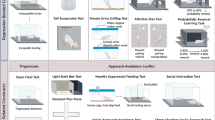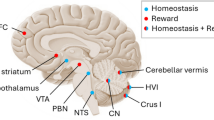Abstract
Administration of the dopamine receptor blocker pimozide (1.0 mg/kg) disrupted the initiation, but not the maintenance, of home cage food consumption. Likewise, the number of pellets consumed during magazine training was decreased among pimozide-treated rats during the first, but not the second day of training. The acquisition of a bar-press response for food reinforcement (using a retractable bar) was severely retarded by pimozide. However, such an impairment was not evident if animals initially received 2 training days in the absence of the drug. Further, among rats trained to bar press to asymptote using a nonretractable bar, pimozide reduced the within and between days bar-press rate such that performance was indistinguishable from that of animals placed on extinction in the absence of the drug treatment. When transferred from the pimozide treatment to extinction in the absence of drug, the response rate increased to the level observed during the first session of either extinction or pimozide in the continuous reinforcement condition. The results are discussed in terms of sensory-motor and reinforcement consequences of dopamine receptor blockade.
Similar content being viewed by others
References
Anisman, H., Rémington, G., Sklar, L. S.: Effects of inescapable shock on subsequent escape performance: Catecholaminergic and cholinergic mediation of response initiation and maintenance. Psychopharmacology 61, 107–124 (1979)
Fibiger, H. C.: Drugs and reinforcement mechanisms: A critical review of the catecholamine theory. Annu. Rev. Pharmacol. Toxicol. 18, 37–51 (1978)
Fibiger, H. C., Zis, A. P., Phillips, G.: Haloperidol-induced disruption of conditioned avoidance responding: Attenuation by prior training or by anticholinergic drugs. Eur. J. Pharmacol. 30, 309–314 (1975)
Fouriezos, G., Wise, R. A.: Pimozide-induced extinction of intractranial self-stimulation: Response patterns rule out motor or performance deficits. Brain Res. 103, 377–380 (1976)
Marshall, J. F., Levitan, D., Stricker, E. M.: Activation-induced restoration of sensory-motor functions in rats with dopamine-depleting brain lessions. J. Comp. Physiol. Psychol. 90, 536–546 (1976)
Wise, R. A.: Catecholamine theories of reward: A critical review. Brain Res. 152, 215–247 (1978)
Wise, R. A., Yokel, R. A., Hansson, R. A., Gerber, G. J.: Concurrent intracranial self-stimulation and intravenous amphetamine self-administration in rats. Pharmacol. Biochem. Behav. 7, 459–461 (1977)
Wise, R. A., Spindler, J., deWit, H., Gerber, G.: Neuroleptic-induced “anhedonia” in rats: Pimozide blocks the reward quality of food. Science 201, 262–264 (1978)
Yokel, R. A., Pickens, R.: Extinction responding following amphetamine self-administration determination of reinforcement magnitude. Physiol. Psychol. 4, 39–42 (1976)
Yokel, R. A., Wise, R. A.: Increased lever pressing for amphetamine after pimozide in rats: Implications for a dopamine theory of reward. Science 187, 547–549 (1975)
Author information
Authors and Affiliations
Rights and permissions
About this article
Cite this article
Tombaugh, T.N., Tombaugh, J. & Anisman, H. Effects of dopamine receptor blockade on alimentary behaviors: Home cage food consumption, magazine training, operant acquisition, and performance. Psychopharmacology 66, 219–225 (1979). https://doi.org/10.1007/BF00428309
Received:
Accepted:
Issue Date:
DOI: https://doi.org/10.1007/BF00428309




